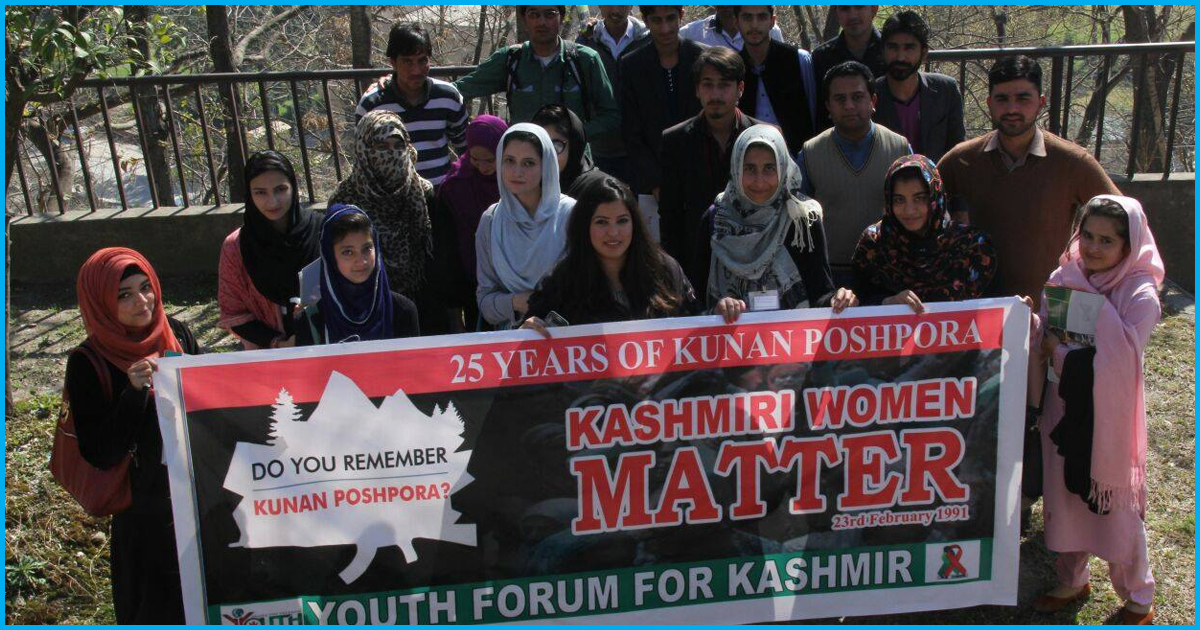
Even After 28 Years, The Kunan-Poshpora Mass Rape Survivors Continue To Await Justice
25 Feb 2019 11:41 AM GMT
Editor : Sumanti Sen
Sumanti Sen is an English Literature graduate who believes "there's just one kind of folks. Folks.".
Deep in the Kashmir Valley, the cold, dark night of February 23, 1991, seemed like any other night to its inhabitants. It was a freezing moonlit February night, with this part of the world covered in snow. A thick layer of frost covered the windows of the houses, and the cold wind was like a slap on the face.
Like any other night, little girls sat cuddled against their mothers with a kangri (a Kashmiri fire pot) lying in the middle.
What the knee-deep snow and the Himalayan mountains surrounding the two nondescript villages, Kunan and Poshpora, in the India-administered Kashmir valley, saw that night is what the rest of the world often looks at with indifference today.
That night, over 300 Indian Army personnel raided Kunan and Poshpora and gang-raped over 100 girls and women. With barns turning into torture chambers, nearly 200 men were tortured.
The unimaginable atrocities
“Rape” is perhaps not an adequate enough word to describe what was done to the women that night. It was war. While the Army personnel separated the husbands and fathers and sons, the women were gang-raped at gunpoint. Mothers were raped in front of their children. The men did not spare pregnant women, the deaf and dumb, the minors and the physically handicapped. Granddaughters and their grandmothers were raped in the same room. Men were sexually tortured and given electric shocks.
All houses had similar stories that night, with entire households of men and women unable to feel the warmth of the sun the next morning. The next morning was marked by paralysing pain and utmost horror.
Yet, after all these years, the Armed Forces Special Powers Act (AFSPA) allows the Indian Army to continue to exercise barbarism and enjoy complete impunity. Allowed by the law, personnel from the Indian Army have the right to enter any premise of the Kashmir Valley at any time, without a search warrant, and if they deem necessary, use lethal force. While extrajudicial killings by Indian forces have been repeatedly condemned by human rights groups, the Indian state has hardly ever taken any responsibility for the abuse that men and women have suffered at the hand of the Indian Army.
Kashmir has become one of the most militarised areas in the world, with the snow white expanses getting stained in blood every day. Thousands of women have been raped, several men have disappeared and innumerable people have been victims of extrajudicial killings. Several men have been illegally detained and tortured. The 1991 Kunan-Poshpora incident epitomises the extent of the oppression and barbarism, with Kashmir and its people being held down against their will by the Indian Army.
The struggle for justice
While only 30-40 women among the hundreds stepped forward to seek justice, the others were asked to keep quiet by their village elders; how else would they find a groom?
Getting the local police to register complaints was only the beginning of the struggle for justice. The demand for an investigation was in vain, as the households witnessed the closure of the case due to lack of evidence. Their screams had also been in vain, while they were raped and tortured, as no one had come forward to help. For the last three years, a case in the Supreme Court has been awaiting a hearing.
Some organisations, including the Jammu Kashmir Coalition of Civil Society (JKCCS), have been continuously trying to wake up the Indian state and make them act against the atrocities of the Indian Army on Kashmiris. In an attempt to keep alive the memories of what had happened that night in Kunan-Poshpora and several others incidents of rape and murder of Kashmiri women, February 23 has been deemed as Kashmiri Women’s Resistance Day by the women of Kashmir. Despite all the battles, rape continues to be a weapon of intimidation all over the world.
Remembering that fateful night in 1991 is not easy for the survivors. The screams and the smell of liquor, the men in uniform and the women at their feet, the agony and the terror, have refused to become a distant reality. But what about justice? As long as justice is denied, forgetting and giving up is definitely not an option. The media and the common man may take pride in protesting against an issue until another issue makes headlines, but this short-lived concern is not for the Kashmiris who had to suffer at the hands of the army men that night. They would rather have that night in Kunan-Poshpora etched in history. They would never forgive or forget.
Also Read: Tripura Government Revoked Controversial AFSPA After 18 Years
 All section
All section













